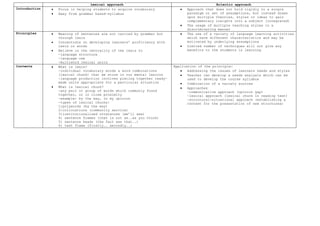
Comparison between lexical and eclectic approach
- 1. Lexical approach Eclectic approach Introduction Focus in helping students to acquire vocabulary Approach that does not hold rigidly to a single Away from grammar based-syllabus paradigm or set of assumptions, but instead draws upon multiple theories, styles or ideas to gain complementary insights into a subject (integrated) The usage of multiple teaching styles in a discriminating manner Principles Meaning of sentences are not carried by grammar but The use of a variety of language learning activities through lexis which have different characteristics and may be Concentrate on developing learners’ proficiency with motivated by underlying assumptions lexis or words Limited number of techniques will not give any Believe in the centrality of the lexis to benefits to the students in learning -language structure -language use -multiword lexical units Contents What is lexis? Application of the principle: -individual vocabulary words & word combinations Addressing the issues of learners needs and styles (lexical chunk) that we store in our mental lexicon Teacher can develop a needs analysis which can be -language production involves piecing together ready- used to develop the course syllabus made units appropriate for a particular situation Combination of a variety sources What is lexical chunk? Approaches -any pair or group of words which commonly found -communicative approach (opinion gap) together, or in close proximity -lexical approach (lexical chunk in reading text) -example: by the way, in my opinion -structural-situational approach (establishing a -types of lexical chunks: context for the presentation of new structures) 1)polywords (by the way) 2)collocations (community service) 3)institutionalised utterances (we’ll see) 4) sentence frames (that is not as..as you think) 5) sentence heads (the fact was that..) 6) text frame (firstly.. secondly..)
- 2. Criticism Lewis (1993) Advantages of an eclectic method ~PRINCIPLE 1: GRAMMATICALISED LEXIS Safety; the usage of a variety of methods Lexical approach is the development of communicative and approaches increases the changes of approach learning to take place Language is learnt by an increasing ability to break Interest; teacher can use different methods down wholes into parts to hold students’ attention Grammar is acquired by a process of observation, Diversity; different learning/ teaching hypothesis and experiment. contexts require different methodologies Use whole phrases without understanding their Flexibility; awareness of range of available constituent parts techniques will help teachers to exploit Acquisition occurs when there is contact with a materials better and manage unexpected sympathetic interlocutor of a higher level of competence situations in TL Inter language skills Lexis is central in creating meaning, grammar plays a -a scale of languages that fit the level of subservient managerial role students’ language skills at any moment ~PRINCIPLE 2: COLLOCATION IN ACTION Comprehensible input Strange combination of words in native-speakers’ ears -if we do not understand the input, we cannot ~PRINCIPLE 3: NOTICING learn Teacher will guide the students Sometimes it will occur on it’s own Negotiation of meaning Noticing is explicit & implicit -interactional hypothesis that states that ~PRINCIPLE 4: LANGUAGE AWARENESS learning comes about in the moment of exchange Learning can occur affectively if teacher implements the between a native speaker and a non-speaker language awareness approach to learning with a lexical approach to describe language. Product oriented approach Teacher helps students to be aware of how language -accumulation of bits and pieces of a language functions Schmitt (2000) Mind is able to store large amounts of information in long term memory but its short term capacity is much more limited When producing language in speech, it is much more efficient for the brain to recall a chunk of language as if it were one piece of information Activities Intensive and extensive listening and reading in the Set induction target language Begins with inductive activity Comparison between L1 & L2 (chunk-language awareness) Identify different uses of synonyms of Repetition and recycling of activities movement based on reading text Guessing the meaning of vocabulary Practice Activities which will evoke the students to identify the Practise these using Total Physical Response lexical chunk; collocations; in the materials (TPR) Next lesson Use task-based approach The input is recycled through a task-based Don’t teach vocabulary out of context lesson Don’t teach isolated words; try to collocate them (bank Students instructed to produce the account) instructions for an exercise manual